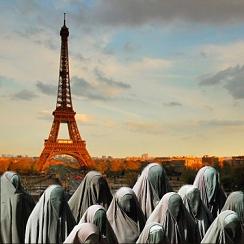France. Ban on Muslim Burka: A Cynical Ploy to Stoke Islamophobia

French President Nicolas Sarkozy is playing with fire after his country’s parliament voted to ban Muslim women from wearing the Islamic veil in public places.
Last month, Sarkozy ordered the French parliament to debate introducing a ban on Muslim women donning in public the garment known as the burka or nijab, which covers the face except for the eyes.
This week, 11 May, the French parliament voted unanimously – after 30 communist deputies walked out in protest – to condemn the practice of Muslim women wearing the burka publicly. The ban is expected to become law later this year. France will be the second European country after Belgium to introduce such legislation that in effect criminalises Muslims over their choice of dress, which is seen as a symbol of religious devotion.
Under the French ban, a woman wearing the burka can be stopped on the street by police and ordered to a police station where she will be compelled to remove the veil and identify herself. The “offender” will also face a heavy financial fine. Muslim men who are deemed to have “forced” their wives or daughters to wear the burka will also be fined.
The parliamentary move has provoked an outcry among France’s five million Muslims who say that the ban is an unwarranted stigmatisation of their community. The French Muslim community mainly comes or descends from France’s former colonies in North Africa – Algeria, Morocco and Tunisia. At 12 per cent of the total population, France has the largest Muslim community in Europe.
Five years ago, long-held grievances of alienation, poverty and police harassment exploded into three weeks of riots in Muslim ghettoes in Paris, Lyon, Lille and Marseilles. Thousands of cars and other properties were torched on a nightly basis in what French police described as “war zones”.
France’s national debate over the burka has fuelled lingering tensions, with rhetoric that has at times bordered on gratuitously reckless. French politicians calling for the ban have described such women as “walking coffins” and “phantoms” in public places.
President Sarkozy himself has said that the burka “is not welcome” in his country. He claims that it is “oppressive” to women and reduces them to “servitude”.
Advocates of the ban accuse members of the Arab community of not conforming to French national identity. They claim that at issue is the defence of women’s rights and the promotion of the Fifth Republic’s values of secularism and “liberty, equality, fraternity”.
The narrative about women’s rights has echoes of one of the most tenuous justifications used by the US and its NATO allies to invade Afghanistan – the “liberation of women oppressed by the Muslim fundamentalist Taliban”.
In other words, there would appear to be something “faux” – as the French might say – about the motives for why their political class is driving the issue of the burka.
Official figures would tend to bear out the contention that the “problem” is being inflated out of all proportion.
From the rhetoric wielded one could be forgiven for thinking that French society was being destabilised by an army of women clad from head to toe in black gowns. However, figures from the French interior ministry put the number of women who wear the burka at 1,900. That’s less than 0.04 per cent of the total Muslim population. (French intelligence services estimate the number to be even lower, and it is disquieting that they should be even keeping a score on such a matter.)
Contrary to common misunderstanding, Islam does not compel women to cover their faces. Wearing the burka, nijab and hijab (head scarf) is optional. The minority of women who chose to dress with the burka do so of their own volition for personal religious/cultural reasons. In Arab culture, women themselves place a high value on modesty in public appearance.
So what is going on here?
Firstly, there is a lot of French political vanity involved. By presenting the country as a bastion of equal rights and a knight in shining armour “defending women against oppression” – the advocates of the burka ban no doubt can puff their chests with pride that La France is standing tall and courageous on the world stage.
Secondly, the spurious debate and disproportionate national concern distracts, ironically, from the real world fact that French society is far from a bastion of equal rights, with its impoverished Muslim ghettoes as a glaring case in point.
Thirdly, and more seriously, the agenda serves as a way of stirring up “Islamophobia” – to disseminate the notion that there is “an enemy within” in the form of the Muslim community. When French politicians talk about “phantoms in public places” that is sending an insidious message to the wider population that there is something abnormal, un-human, even dangerous about these women and by extension their wider community. As in the US, Britain and other NATO countries, this Islamophobia is less about Muslim women covering up their faces and more about governments covering up their criminal wars in Muslim countries. It is yet another way of trying to bolster public support for the “war on terror”.
But Sarkozy and his parliament’s latest gambit could backfire with dangerous consequences for French society and beyond.
One Muslim woman, originally from North Africa now living in France, said: “Liberty, equality, fraternity – it’s all a big lie” and she compared the situation with 1939-45. “They are now doing to Muslims what they did to Jews.”
Given the French political establishment’s heinous collaboration with Nazi Germany in the persecution of Jews, communists and other “undesirables”, Sarkozy in this latest French move to ban the burka is indeed playing with fire.
Finian Cunningham is a journalist and musician www.myspace.com/finiancunninghammusic

